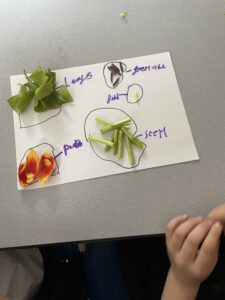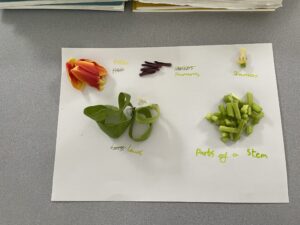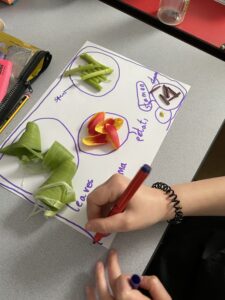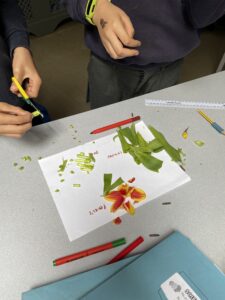Week beginning 06 June 2022
Hi everyone
We hope you’re feeling happy and healthy at home. We miss having you in school but we want you to know that you’re still very much part of our school community. Enjoy your home learning for this week.
Maths
Follow this sequence of maths learning which is linked to time.
- Lesson 1: video, worksheet, answers
- Lesson 2: video, worksheet, answers
- Lesson 3: video, worksheet, answers
- Lesson 4: video, worksheet, answers
- Lesson 5: video, worksheet, answers
- Lesson 6: video, worksheet, answers
- Lesson 7: video, worksheet, answers
- Lesson 8: video, worksheet, answers
- Lesson 9: video, worksheet, answers
- Lesson 10: video, worksheet, answers
You don’t have to print the worksheet. Your child can write or draw their answers on paper. Your child’s learning will be most effective if you sit with them to pause the clip and check / praise / support your child as the clip moves on.
Practise times tables on Times Table Rockstars, too. If your child is in Y3, we’re concentrating on the 8 times table. If your child is in Y4, we’re concentrating on all times tables up to and including 12 x 12. Email the class teacher if you need your child’s login and password details.
(Suggested time: 30 minutes of Maths and 15 minutes of Rockstars daily)
Spelling
Look on the homework page to find this week’s spellings. They should choose some past spellings that they feel less confident with. Your child should complete one task each day.
- Day 1: Generate more words linked to the spelling pattern or ‘rule’. You could look out for the words in the book you’re reading at home, or any other text, like a website linked to our science topic of Living Things and their Habitat.
- Day 2: Practise the spellings using two of the ideas in our Super Spelling Strategies guide. (Set yourself and others at home a challenge of using some of the words when you’re speaking, too!)
- Day 3: Write separate sentences, each containing one of the spellings. (Don’t forget to show off really neat handwriting and make sure you sentence starts with a capital letter and ends with a full stop, exclamation mark (!) or question mark (?).
- Day 4: Repeat Task 2 or 3.
- Day 5: Get an adult at home to test you on your spellings. Practise any you spell incorrectly – you could write them out carefully until you’re sure.
(Suggested time: 15-20 minutes daily)
Reading fluency
This is the text we’re using in class this week to build up fluency skills.
In school, we generally follow this sequence:
- Day 1: Read the text aloud with your child listening. Read it clearly and slowly, pointing to each word as you read. Have a chat about any unfamiliar words.
- Day 2: Read aloud each sentence (a full short sentence or part of a longer sentence), and have your child read it back to you. Do this ‘echo reading’ for the whole text.
- Day 3: Read the text and talk about the effect of the punctuation on how you read it – pauses for full stops and expression for exclamations (!) or questions (?). Your child reads the text aloud.
- Day 4: Read together with expression (just like you practised on Day 3).
- Day 5: Your child reads independently and fluently.
(Suggested time: 15 minutes daily)
Reading comprehension
We’ll be using this RIC text in class to practise comprehension skills. RIC stands for:
- Retrieve: finding information in a text
- Interpret: using clues in the text to unlock information
- Choice: thinking about the author’s choice of words, techniques or organisation that make the text interesting and enjoyable to read
Follow these lessons from Oak National Academy. There’s a whole series of lessons, but start at Lesson 1 and work through, doing one (or maybe even two) each day. (If you’re self-isolating in your second week, stick with the series of lessons you’ve already started and aim to complete the full series.)
(Suggested time: 30 minutes daily)
Writing
Follow these lessons from Oak National Academy. There’s a whole series of lessons, but start at Lesson 1 and work through, doing one (or maybe even two) each day. (If you’re self-isolating in your second week, stick with the series of lessons you’ve already started and aim to complete the full series.)
(Suggested time: 30-40 minutes for each)
Topic
Our topic this half-term is about design & technology: textiles.
Follow these lessons from Oak National Academy. There’s a whole series of lessons, but start at Lesson 1 and work through, doing one (or maybe even two) each day. (If you’re self-isolating in your second week, stick with the series of lessons you’ve already started and aim to complete the full series.)
(Suggested time: 30-40 minutes)
Science
Our focus this half-term is about food and our bodies.
These six lessons from Oak National Academy link closely to what we’ve been doing in class. Start at Lesson 1 and work through, doing two or three in the week. If you’ve previously completed on of these lessons, have a go at the ones you haven’t completed yet.
If Science really motivates your child, you could also use look at these lessons all about practical Science.
(Suggested time: 30-45 minutes)
PE
Don’t forget to do some daily exercise!
Do two or three of these Five Minute Moves from Joe Wicks each day – spread them across the day as if they were playtimes, maybe!
Try working through this series of 25 lessons from the Association for Physical Education – do two or three in the week.
(Suggested time: 5 minutes daily, plus 30 minutes for the longer PE lessons)
Extra stuff…
As an extra (or as an alternative, if this helps to motivate your child)…
Fancy learning about a new religion? You don’t have to be religious to learn about, and appreciate, religions from all around the world. Check out this set of lessons from Oak National Academy – you could choose to focus on one religion or dip into each set for an overview.
What about some music? Choose one of these units and work through it on Oak National Academy.
Jubilee Celebrations!
We had a fantastic day celebrating the Platinum Jubilee in years 3 and 4. We enjoyed doing crafts such as flag making and even decorated a card to send to the Queen!
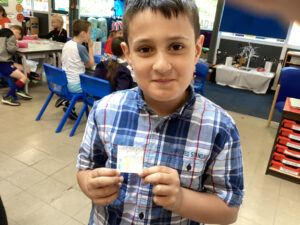
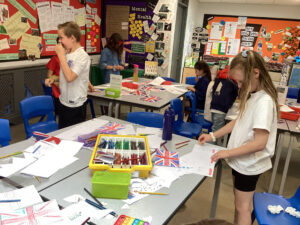
At lunchtime, we had a special picnic and sang the national anthem. Each class performed a dance to represent every decade of the queens reign!
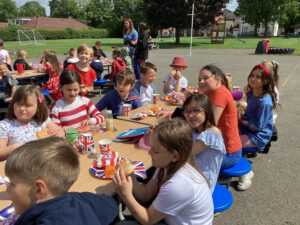
We hope all the children have a fantastic half term and enjoy the
celebrations! 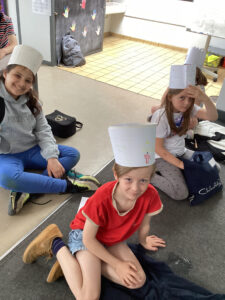
Our school community working together to commemorate the Queen’s Jubilee.
As part of a Wetherby community group, our school has entered a Jubilee craft cake for the Royal Church and Community Fete and Queen’s Jubilee Cake Festival at St James’ Church, Wetherby.
The whole school contributed to this creation and they all thoroughly enjoyed making it.
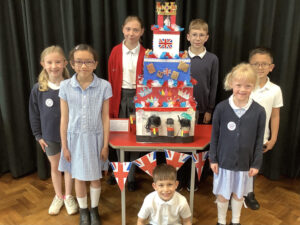
Reception – Beefeaters
Year 1/2 – stamp rubbings and crowns
Year 3 – clay corgi dogs
Year 4 – clay postage stamps
Year 5/6 – Hama Beads flags
We are all very proud to have been part of this and if you would like to attend the festival, it takes place on Friday 3rd June, 10am till 2pm at St. James Church in Wetherby.
Beautiful butterflies and joyful Jubilee!
Wow! We’ve had a wonderful week, here at nursery. We’ve been celebrating the Queen’s Platinum Jubilee and hoping our butterflies would come out of their chrysalises. At the beginning of the week we learned all about the Queen’s transport and looked at some of her special carriages. Then, we looked at some of her crowns and special jewels and, finally, we looked at some of her palaces around the UK. The children also had a look at the Union Jack flag and talked about the colours they could see. On Thursday morning, we had a little nursery tea party together and, in the afternoon, the children had a chance to make their own special crowns ready for the big Platinum Jubilee party on Friday.
All week, we have been wondering when the butterflies would emerge from their chrysalises and, on Wednesday, the first one appeared inside the special net cage. By Friday, all of them were flapping happily around the cage and we were very excited to be able to release them into the wild. We took them outside and opened the zip but the change in temperature and the windy conditions meant that the butterflies were reluctant to leave their safe environment. We decided that the best thing to do was to leave them outside and wait until the afternoon for another try.
The big party went really well and we were first on stage to perform our special dance which we had been practising. The children were fantastic and they were helped by some of our wonderful Year 6 friends. So, we send a big thank you to them. It was lovely to watch everyone else’s performances and we really enjoyed our special party lunch.
In the afternoon, we went outside again and found that the butterflies were ready to leave their home. One-by-one, they flew away until the last one was alone. It took a while for this little butterfly to fly out of the cage and it rested on the ground immediately. We all wondered why this had happened… The children decided that it might be tired or hungry so they all gathered daisies to help it to recover. We watched the butterfly feed and, after a while, it had the strength to fly away. It was a magical end to a magical day!
Please take a look at our fantastic photos from this week and we all wish you a very happy Platinum Jubilee weekend.
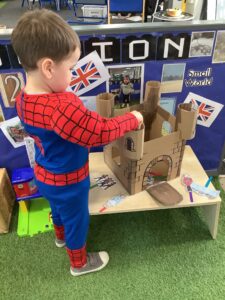
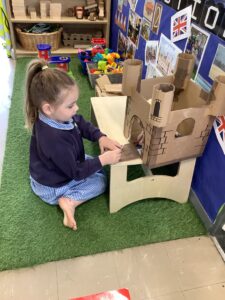
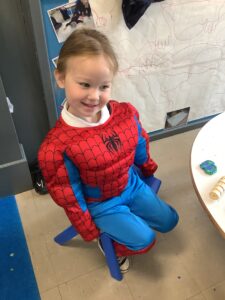

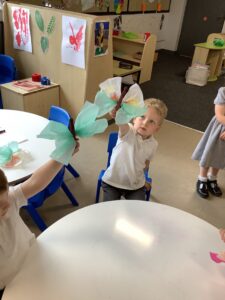
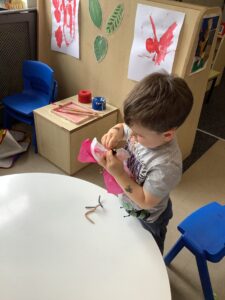
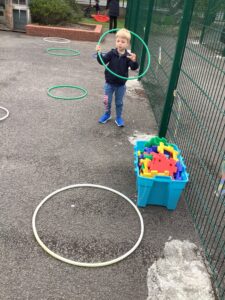
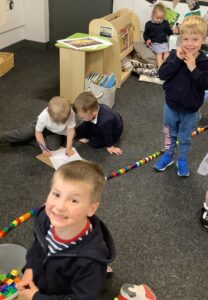
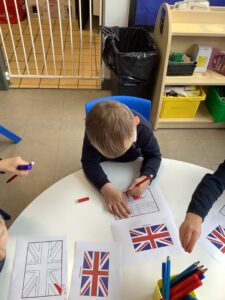
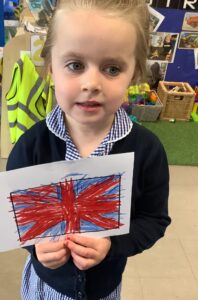
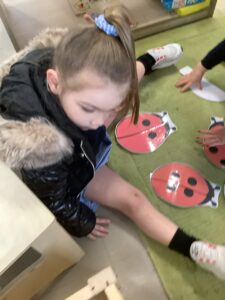
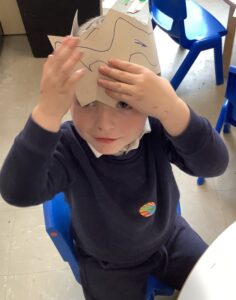
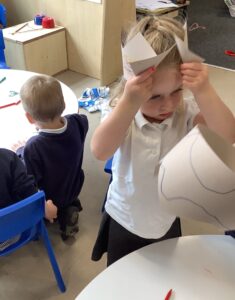
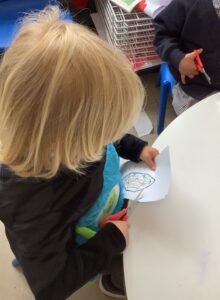
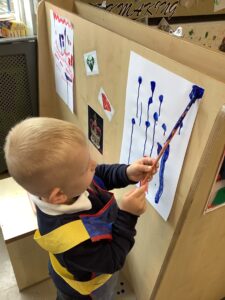
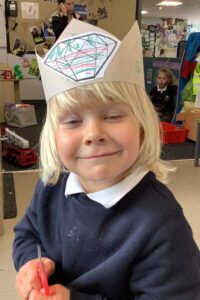
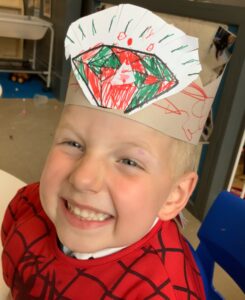
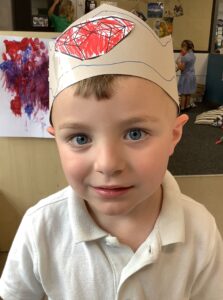
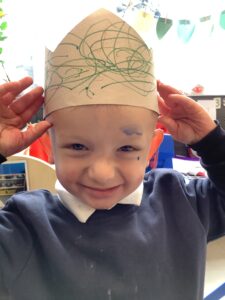
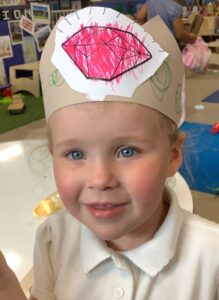
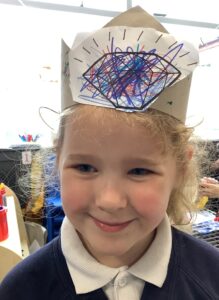
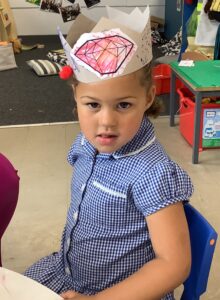

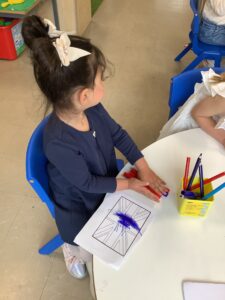

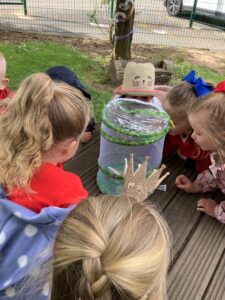
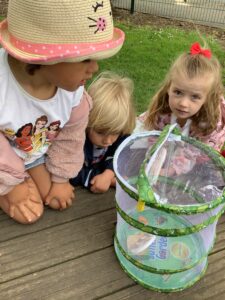
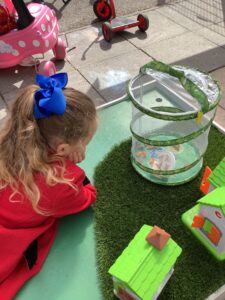
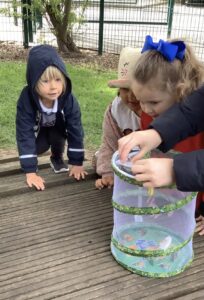

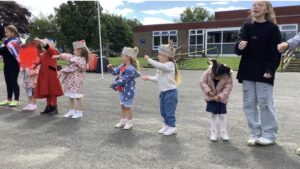
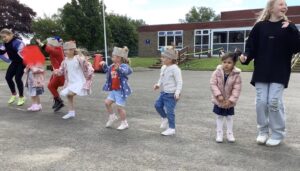

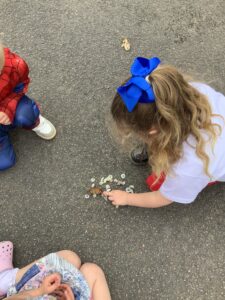
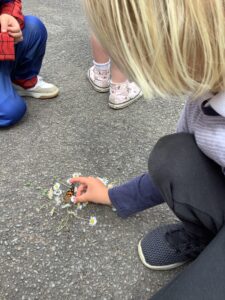
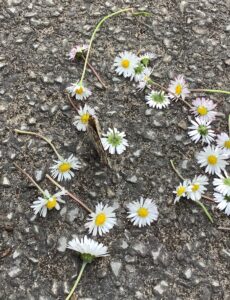
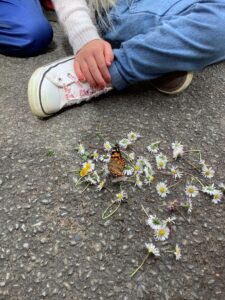
Jubilee
We have had a fun day at school today celebrating the Queens Platinum Jubilee. We shared our WUSU dance and watched the other classes perform theirs too. We then had a picnic outside and sang the national anthem.




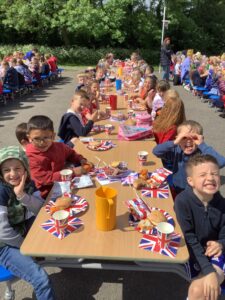
Have a great half term!
Science – plants
This week in Science, we finished off our plant topic by planting some seeds of our own to take care off. We know that they need water, sunlight and warmth to grow. We planted sweet peas, daisies, dahlias and poppys.
Can your child tell you which one they chose? Is it typically a wild or a garden plant?





Topic – Kenya
In Topic this half term, we have been learning all about Kenya. We have each written a report all about Kenya. We photocopied them and brought them home to share. We hope you have enjoyed reading them!

Jubilee and butterflies
This week, it’s been a fun filled Jubilee themed week!
In literacy, there was a lot of laughter when reading The Queen’s Knickers. The children designed a new pair of knickers for the Queen to wear on different occasions.
The Queen will wear these knickers…
MC – when she goes on holiday
HD – wherever she wants to go
DA – when she goes to the park
OR – when she goes to the United Kingdom
Florence – when she sees a rainbow
JD – when she walks her dogs
SF – when she goes to a birthday party
HN – when she goes to the beach
RF – when she goes to Burger King
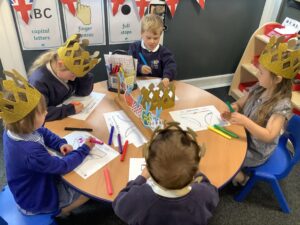
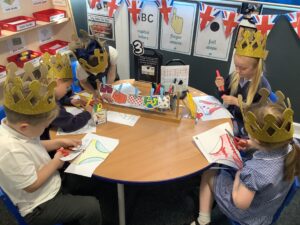
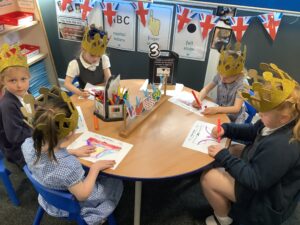
Take a look at their super designs!

At the creative table, the children enjoyed making the Queen’s Guards.
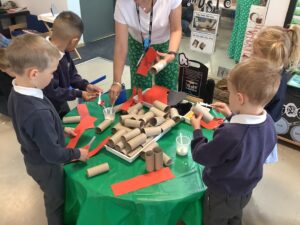
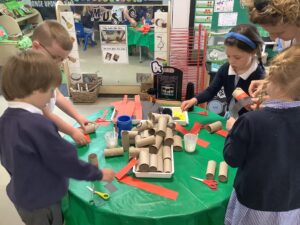

On Tuesday, we learnt that the Queen has had her portrait painted over 130 times! So we thought we would add to this collection and draw our own portraits.

Throughout the week, we’ve been practising the National Anthem ready to sing at our Jubilee party. Click here to watch us.
Butterflies
Over the past few weeks we’ve been closely observing the life cycle of our caterpillars. From Monday, our butterflies finally started to emerge! Today, we had fun releasing them.
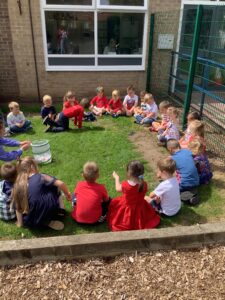
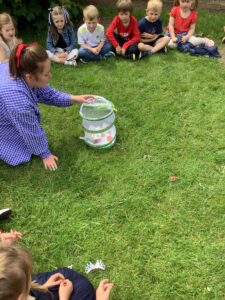
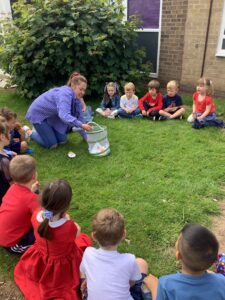
Jubilee party
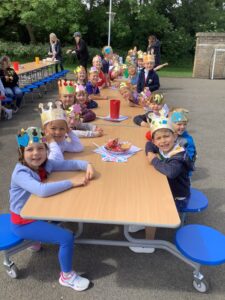
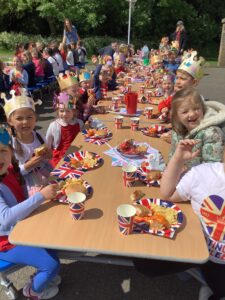 Finally…
Finally…
I hope you all have a happy and healthy half-term with family and friends. Don’t forget to send us photographs of what you get up to. See yo all on Monday 06 June for your final half-term in Reception.
This week’s message (Friday 27 May 2022)
The last message for this half-term comes from Miss Beatson, our Head of School. There’s also a reminder about our annual survey of parents and carers.
We’ve come to the end of the penultimate half term and what a busy one it’s
been!
Children in Year 2 and Year 6 have completed their SATs; they showed great
resilience throughout the testing process. Next half term, Year 1 will be doing their phonics screening and Year 4 will be completing the first ever statutory multiplication check.
On the point of multiplication, I would like to remind all parents of children in Key Stage 2 that your child has access to Times Table Rockstars so they can practise their times table fluency at home- please encourage your child to do this regularly.
Key Stage 1 children have access to Numbots which is a similar website
for your child to practise simple number facts.
Thank you to the parents who attended our first coffee morning since Covid.
We were overwhelmed with the turnout- we’ve never had as many parents
and carers join us! It was a great opportunity to meet up with other parents,
do some activities alongside the children, and talk to Mrs Small, our Learning Mentor.
We’ll plan in termly coffee mornings now we’re able to welcome parents back into school.
The PTA have been meeting regularly. Last week, the school disco was a huge success and I want to say a big thank you to all involved. The total raised from the event was £351.59! They’re now busy preparing for our summer fair.
This term, the whole school attendance has dropped below national figures – this is disappointing. As we’re all aware, the children have missed so much school over the past few years that it’s more important than ever that children are in school learning. If your child is going to be absent from school, please phone the school office and let us know the reason for your child’s absence, otherwise the absence is recorded as unauthorised.
Today, our children have enjoyed the Jubilee celebrations in school with
dancing, a picnic and lots of craft activities. Throughout the week, each class has worked together to create an amazing ‘craft cake’ for the Queen’s Jubilee Cake Festival which will be displayed in St James’ Church on Friday 03 June. Well done to all the children and staff for creating such a magnificent cake!
I hope everyone has a lovely half term break.
And here’s a reminder about the annual survey…
Your views matter. Every year, we invite you to complete a short survey. Complete the St James’ CE Primary survey here. It’ll only take a few minutes to complete – thanks!
Whatever you and your child get up to, have a happy and healthy half-term holiday.
Science: Pollination
Today, we have been biologists. Can your child tell you what a biologist studies?
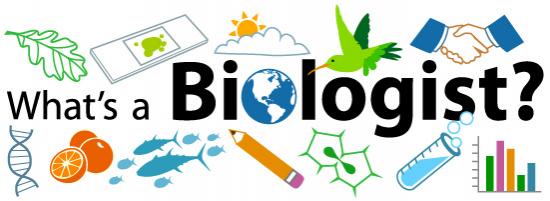
The children learnt about pollination. Pollination must happen so flowers can grow seeds.
In the pollination process:
Male parts of a flower produce pollen and female parts produce eggs.
To make a new plant, one pollen has to join up with one egg.
How does the pollen travel?
The pollen has to get from one flower to another flower.
Some flowers use insects to do this. Some use the wind to carry the pollen instead. The children studied the diagram below to see how pollen is transported.

Next, we looked closely at the male and female parts of a flower.
Female parts produce eggs and this is called the stigma.
Male parts of a flower produce pollen and this is called the stamen.
Using some tulips, which are a type of flower, the children began to dissect the flower and examine the different parts.
Ask your child about this learning. What can they remember? How did they group the parts of the flower?
